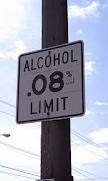 If you see blue lights come on behind your vehicle and it’s after midnight on about any day of the week, chances are the Officer stopping your vehicle is going to ask you if you have consumed any alcohol that evening. If he smells even the faintest odor of alcohol a Driving While Impaired investigation is almost certainly to follow. Hopefully after performing some routine field sobriety tests you will be allowed to get back in your vehicle and drive away, however, you may find yourself being placed in handcuffs and arrested.
If you see blue lights come on behind your vehicle and it’s after midnight on about any day of the week, chances are the Officer stopping your vehicle is going to ask you if you have consumed any alcohol that evening. If he smells even the faintest odor of alcohol a Driving While Impaired investigation is almost certainly to follow. Hopefully after performing some routine field sobriety tests you will be allowed to get back in your vehicle and drive away, however, you may find yourself being placed in handcuffs and arrested.
The strongest piece of evidence for the state in the majority of Driving While Impaired cases is a sample of a person’s breath. Most individuals who are charged with Driving While Impaired submit to a sample of their breath on the intoxilzer because they think they think they will get bonus points in court by being “cooperative” and because when they are read their rights with respect to taking the test, they are informed that if they refuse to take the test their driver’s license will be revoked for one year. So if you blow a .08 or above on the breathalyzer, do you need to begin preparing for life after a DWI conviction or is there still hope?
The bottom line is the state’s case is certainly stronger with a reading than without one. However, a person who registers a .08 or above on the intoxilyzer is not automatically guilty of Driving While Impaired. In a recent decision the North Carolina Court of Appeals in State v. Narron held that a reading of .08 or above does not constitute a mandatory presumption of guilt for a person charged with Driving While Impaired. Rather, the reading on the Breathalyzer is simply reliable evidence to satisfy the State’s burden of proof as to this element of the offense of DWI.
Well you’re probably thinking if its reliable evidence isn’t that just as good as a presumption of guilt? The answer is of course “no”. Being a good criminal defense attorney means defending with ingenuity. If the Intoxilyzer is nothing more than “reliable” evidence, it can certainly be shown to be unreliable. The Intoxilyzer is not a magic box that always produces an accurate reading regarding a person’s breath alcohol content. If a prosecutor is allowed to submit a reading, without any rebuttal or any suggestion to the jury regarding the problems with breath testing or the problems with the Intoxilyzer, the fact finder will accept the reading as sufficient or “reliable” information as to a person’s alcohol concentration.
J. Bradley Smith is a criminal defense attorney in Charlotte who has helped countless clients who have faced DWI charges. If you or a friend find yourself in need of an attorney, please contact Arnold and Smith, PLLC at 704-370-2828.
 Charlotte Criminal Lawyer Blog
Charlotte Criminal Lawyer Blog

